Various local and state educational institutions close their doors in response to COVID-19
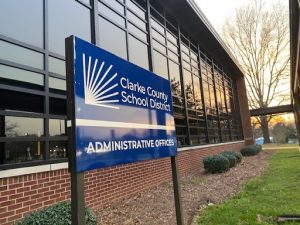
On March 12, Clarke County School District Interim Superintendent Dr. Xernona Thomas announced that CCSD would be canceling school for one week, starting March 16, due to the COVID-19 outbreak. Thomas’ announcement followed Georgia Governor Brian Kemp’s recommendation for Georgia schools to suspend all learning for up to two weeks. “We will re-evaluate next Thursday, March 19th, to determine if continued closing is needed. During this closing, there will be no extracurricular activities, sports, school events, or field trips,” Thomas announced in a systemwide email. “As additional information and guidance are provided, updates will be shared.” Photo by Krista Shumaker
Many school systems in Georgia, including the Clarke County School District, will suspend classes in an effort to contain and limit the spread of COVID-19.
Updated March 16, 2020
On March 12, Georgia Governor Brian Kemp held a press conference to address the outbreak of COVID-19, also known as coronavirus, within the state of Georgia. Kemp encouraged school districts to take action to stop the spread of COVID-19.
“Given the rise of the coronavirus cases, I’m going to issue a call to action for community leaders, educational leaders and childcare providers across our state. If you feel that it is prudent, you should consider closing daycares, schools or school districts as early as tomorrow, through the next two weeks,” Kemp said during the press conference. “I want to emphasize that this is not a mandate. At this point, we believe that local decision making is the right course of action. Regardless of whether you stay open or decide to close, we will support that decision.”
“At this point, we believe that local decision making is the right course of action. Regardless of whether you stay open or decide to close, we will support that decision.”
— Brian Kemp,
Georgia Governor
Following Kemp’s recommendation, the University System of Georgia responded with guidance for its institutions. Locally, the University of Georgia released a message to its campus community announcing it would suspend classes for two weeks.
“Effective Monday, March 16, 2020, all University System of Georgia institutions will temporarily suspend instruction for two weeks to allow time for USG institutions to test their business continuity plans and online instruction modules and for state officials to continue to assess the current situation regarding coronavirus (COVID-19) in Georgia,” Teresa MacCartney, the USG Executive Vice Chancellor of Administration, said in the message.
Dr. John Campbell, an Associate Professor of Accounting at the UGA Terry College of Business, feels that there were multiple reasons for the interruption of classes.
“My personal view is that the suspension was due to two factors. First, (UGA) had to do something. All of our peer institutions in surrounding states had already done something about (the coronavirus),” Campbell said. “Second, the University System of Georgia had to make a decision for all of its many campuses — UGA is just one of them. The faculty at all these institutions had probably been in various states of preparedness for transitioning to online teaching. So, two weeks gave them time to get all campuses up to speed to transition online if that is what ends up being necessary.”
“The University System of Georgia had to make a decision for all of its many campuses — UGA is just one of them.”
— Dr. John Campbell,
Associate Professor of Accounting
Georgia State University in Atlanta was also affected by the pandemic. For 2019 CCHS graduate, Charles Kurian, a freshman at GSU, the plan to move to online teaching will require an adjustment.
“I like learning through a classroom environment. It’s just easier to understand the material for me, so the move to online classes could affect how my learning progresses,” Kurian said.
In the hours after Kemp’s press conference, districts from around the state, such as Gwinnett County, Barrow County, Fulton County and Oconee County began to close. Clarke County School District Interim Superintendent Dr. Xernona Thomas sent an email out to staff, parents and students with a local decision including the CCSD in the initiative to close schools.
For varsity soccer player and sophomore Eleanor Mathews, the school closure has both academic and athletic implications.
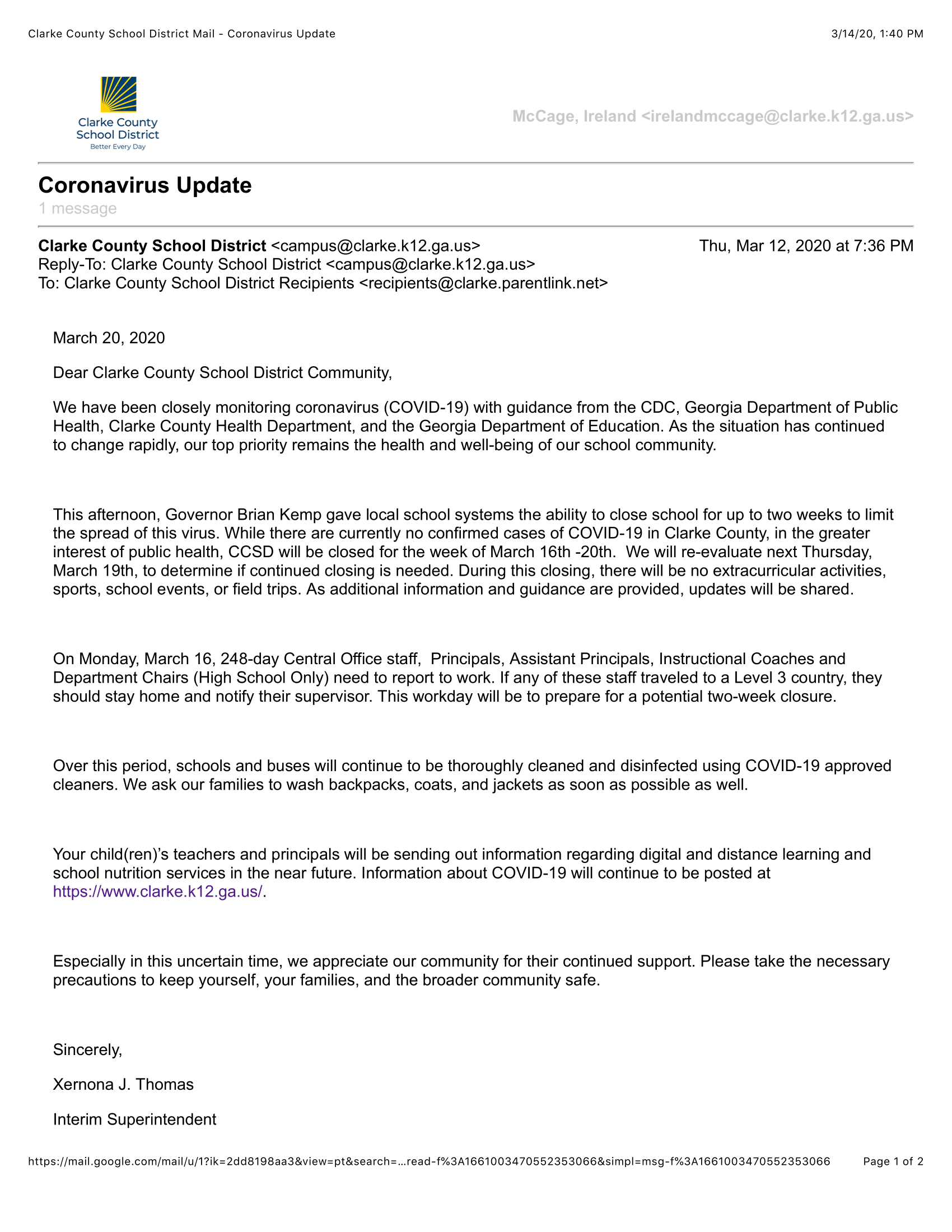
An email sent out March 12 by Clarke County School District Interim Superintendent Dr. Xernona Thomas states the district’s plan to close all schools in the district for a week because of COVID-19. This announcement comes after Georgia Governor Brian Kemp’s press conference where he addressed provided advice on how to try and keep the virus from spreading. “(The government is) hearing from people in every region of Georgia asking us for advice (about COVID-19). In many ways our message continues to stay the same,” Kemp said during the press conference. “We would like to ask people to continue to follow best practices of your help with regular hand washing, avoiding large events if you’re sick, and let me remind everyone that this information continues to be available through the (Center for Disease Control) and the Department of Health.”
“I know myself and I know a lot about other people and most of the work is not going to get done. I’m probably gonna fall behind (academically), not gonna lie, ” Mathews said. “(For) a bunch of people, their (sports) seasons are getting short. You only get four seasons to play high school sports. I know it sucks for the seniors and stuff. We take it seriously (because) it’s (the) only time for a lot of people to be able to play because a lot of people don’t play in college or continue (playing).”
Clarke Central High School English department teacher Jennifer Tesler agrees with Thomas’s decision and plans to adjust her curriculum accordingly.
“I think (closing the schools is) a good idea. I think CCSD made the right decision,” Tesler said. “(The) administration will discuss (changing lesson plans) soon. It’s good to have a plan and it’s good to know when to make the adjustments.”
CCHS parent Bryn Adamson also supports the district’s decision to close schools for a week.
“(Closing the schools is) all about flattening the curve, which really took me a hot minute to grasp, but we want that line to stop going up. The less people are together, the flatter it will get,” Adamson said.
While she agrees with the intent of the decision, Adamson has questions about the impact for students and families in the CCSD community.
“My worry is logistics. What if (students) can’t go back (to school)? What will that look like? My daughter is having the best academic year of her life, and I’d hate for that to be interrupted,” Adamson said. “What about the students who count on school as their only secure space for food and shelter and stability? What happens to them with nowhere to go?”
“What about the students who count on school as their only secure space for food and shelter and stability? What happens to them with nowhere to go?”
— Bryn Adamson,
CCHS parent
In response to concerns about students who rely on school meals, CCSD Communications Manager Beth Moore sent out a press release on March 14.
“(CCSD) will provide free meals to students during the closure caused by the COVID-19 virus. The district will offer meals for pick up at two school sites as well as neighborhood hubs,” Moore said in the release. “Students will receive a breakfast and lunch meal. (The) service will begin Tuesday, March 17.”
Corporate America is also reacting to the impact of COVID-19. Charter Communications has set up an offer to give households with students free broadband and Wi-Fi for the next 60 days.
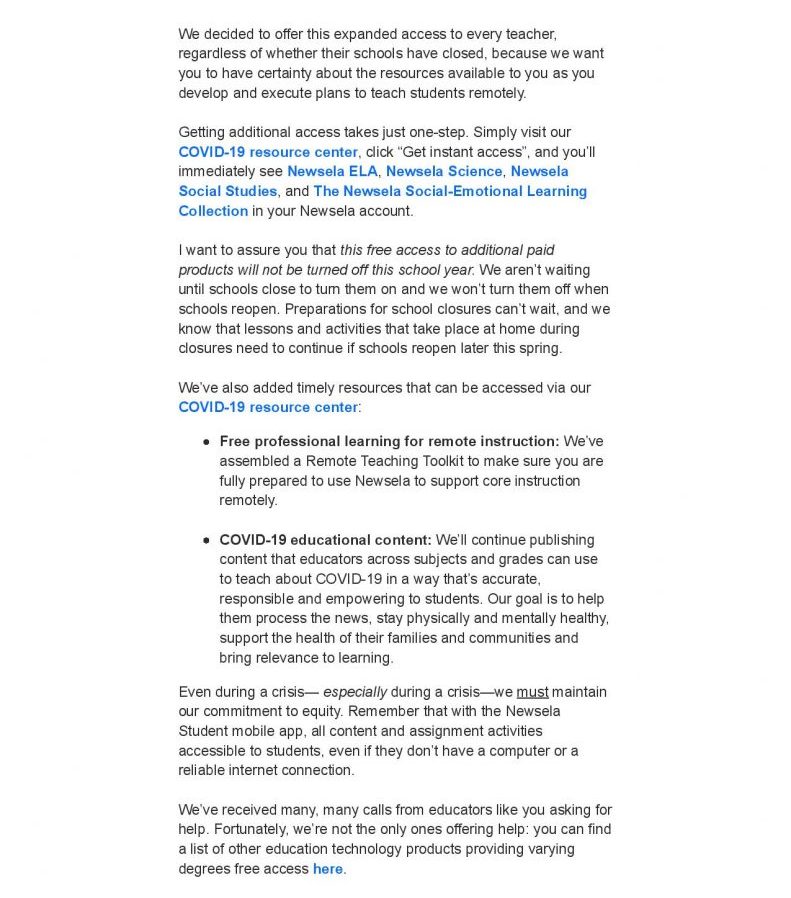
Newsela founder and CEO Matthew Gross sent out an email on March 13 informing educators that all of Newsela’s products will be available for no cost through the rest of the school year. Gross is providing free access to help teachers instruct their students digitally during the COVID-19 crisis. “We decided to offer this expanded access to every teacher, regardless of whether their schools have closed, because we want you to have certainty about the resources available to you as you develop and execute plans to teach students remotely,” Gross wrote in the email. “Preparations for school closures can’t wait, and we know that lessons and activities that take place at home during closures need to continue if schools reopen later this spring.”
“Charter will offer free Spectrum broadband and Wi-Fi access for 60 days to households with K-12 and/or college students who do not already have a Spectrum broadband subscription and at any service level up to 100 Mbps,” the press release read.
The instructional content platform Newsela has also announced plans to support instruction during the outbreak. Founder and CEO Matthew Gross sent an email to educators on March 15 addressing plans to provide access and equity of instruction and resources on his platform.
“We want to support you however we can, starting with this: we are making Newsela’s entire product suite available to all teachers, free of charge, through the end of the school year,” Gross said in the email.
On March 14, Kemp declared a public health state of emergency due to the rapidly increasing number of COVID-19 cases in Georgia.
“Based on President Trump (declaring a national emergency), I will declare a public health emergency for the state of Georgia. This declaration will greatly assist health in emergency management officials across Georgia by deploying all available resources for mitigation and treatment of COVID-19,” Kemp said during a state-wide address. “(This) is a more specialized form of a state of emergency and allows for a more robust response to a crisis, specifically in the healthcare sector.”
Following that announcement, on March 16 Kemp signed another executive order closing all K-12 schools and universities March 18 through March 31.
“In consultation with the Governor’s Coronavirus Task Force and local, state and federal education, health and emergency preparedness officials, I have determined that closing all elementary, secondary and post-secondary public schools in Georgia is a necessary and appropriate action to protect the health, safety and welfare of Georgia’s residents and visitors to help control the spread of COVID-19 throughout this state,” Kemp said in the order.
“I have determined that closing all elementary, secondary and post-secondary public schools in Georgia is a necessary and appropriate action to protect the health, safety and welfare of Georgia’s residents and visitors.”
— Brian Kemp,
Georgia Governor
Outside of the immediate impact on education, Mathews feels the COVID-19 outbreak is troubling.
“It’s kind of scary to think about because it doesn’t really feel real honestly, but it is real and that’s the scary thing. It seems like something that’s come out of a movie but it’s happening in real life now,” Mathews said. “The other day my mom went to the store and there’s barely any groceries just because everyone’s raiding everything, like (it is) the world apocalypse. It is kind of scary.”
The CCSD will be posting additional information on its website. As this story develops, the ODYSSEY Media Group will continue to provide updates.
*As of March 16, there are three confirmed cases of COVID-19 in Clarke County.
ODYSSEY Media Group COVID-19 update
Everyone,
We are currently living in unprecedented times. With the outbreak of COVID-19, physical schooling in the Clarke County School District and many others nationwide has been postponed to try and slow the spread of this virus. Adjusting to this new normal is just as difficult for the ODYSSEY staff as it is for everyone else.
Ensuring that the spread of this virus is minimized presents many obstacles for almost every part of daily life, and severely hinders the ability of ODYSSEY Media Group reporters to interview, take pictures and conduct tasks essential in journalism.
Even with the inability to physically meet, the OMG staff has been hard at work delivering information and updates as quickly as possible. We do ask, however, for some patience during these difficult times.
Our website will likely not continue to be updated daily and issue four of the magazine, which was in the early stages of production when the outbreak hit, may be reduced, or released solely online. We understand this can be frustrating, and realize the importance of our work now more than ever.
Our website and social media pages will continue to be updated as much as possible during this difficult time, and we encourage everyone to look towards local media and official sources (CDC and CCSD) for additional information.
Please stay safe. We will share more information in the future, and continue to inform our community to the best of our ability.
— ODYSSEY Media Group Leadership Team
Boiling point: What we should learn from COVID-19

United States President Donald Trump poorly addressed the issue of COVID-19 currently facing America. Now the American citizens face the consequences from the poor leadership of the White House. Illustration by Audrey Kennedy
Managing Editor Naomi Hendershot reflects on the pandemic the United States is facing and how it should be a wake-up call to the U.S. government to recognize its poor leadership in defending the country against the COVID-19.
For centuries, nations around the world have been affected by surges of disease, such as the bubonic plague, the spanish flu, smallpox and polio. Of course, back then technology and medicine were not in a place to properly prevent the rapid spread of such diseases.
Now, with modern advancement in these fields, our nation should be able to prevent the spread of viruses prior to the point of a pandemic. But unfortunately, that is not what has happened in the United States when facing COVID-19.
“Now, with modern advancement in these fields, our nation should be able to prevent the spread of viruses prior to the point of a pandemic.”
Health experts such as the World Health Organization and the Centers for Disease Control and Prevention continuously warned the public and U.S. government officials about the potential impacts of COVID-19 if it continues to spread.
“We have a window of opportunity now for the rest of the world. We see what’s happening in China in terms of the number of cases and fatalities, so if we don’t use the window of opportunity we have now, if we don’t operate with a sense of urgency, there could be a serious consequence,” WHO Director-General Tedros Adhanom Ghebreyesus said at a press conference. “I will continue to remind until the world really takes this seriously, does it with a sense of urgency and believes from the heart that time is of the essence now.”
Yet, there was still a delayed reaction from the Trump administration to contain the virus. Along with the delayed reaction, President Donald Trump blatantly downplayed how serious this virus actually was.
Now, the US is facing the economic and social repercussions of the President and his administration’s poor leadership in containing the outbreak of COVID-19.
With the progressive nationwide shutdown, many local businesses closed their doors indefinitely. Other larger companies and businesses cut costs by laying off droves of employees. According to the U.S. Department of Labor, 6.6 million people have filed for unemployment. During the Great Depression, the unemployment rate reached 24.9%. It is projected that the unemployment rate this year will peak at 30%, according to the Federal Reserve Bank of St. Louis President James Bullard.
“During the Great Depression, the unemployment rate reached 24.9%. It is projected that the unemployment rate this year will peak at 30%.”
The Trump administration’s lack of action is now costing the livelihoods of working-class Americans. Without a steady income, many Americans are unable to pay for essential things like food, housing, clothing and other necessities.
Along with disruption to the economy, the U.S. government is not supplying hospitals around the country with enough personal protective equipment (PPE) to safely care for their patients without the risk of getting themselves infected. According to an article published by NPR, hospitals are limiting N95 masks to one per medical staff for every five days.
Even COVID-19 tests are in short supply. According to an article published by Quartz, many labs around the country are reporting shortages of chemicals and other materials necessary to perform diagnostics tests.
Of course, other countries around the world are threatened by COVID-19 — Italy, Spain and Germany to name a few. But America should’ve seen this coming.
Had the Trump administration followed the example of South Korea, for instance, America might’ve been in a better position to recover quickly. The South Korean government took the necessary precautions in order to minimize the spread of the diseases by testing more than 270,000 people for COVID-19 in early March. They even tested citizens who did not show symptoms. This way they were able to detect the source of spreading if an outbreak occurred.
“Had the Trump administration followed the example of South Korea, for instance, America might’ve been in a better position to recover quickly.”
It has become evident over these past two months that the U.S. government is extremely unprepared for what lies ahead. The Trump administration should’ve begun taking serious precautions when the nation began seeing its first cases in January, and even now, there is still slow action to fix their mistakes.
During these difficult times, however, the importance of community has shown through more than ever. Many communities across the nation are coming together in order to support one another, from volunteering at school food drives, making masks for medical workers, supporting local businesses and, most importantly, staying home.
Any hopes to slow this pandemic down now rests on the backs of essential workers and the American people.
COVID-19 reveals that school is a safety net for many families

Two aerialists fly on trapezes above their only safety net: an Uncrustables sandwich provided by the Clarke County School District. Students of the CCSD depend on the school district for food, even when school is not in session. Graphic by Emma Scott
The devastating COVID-19 national emergency has highlighted child food insecurity in Athens and the school district’s role in addressing this issue. This crisis should be what motivates Athenians to mobilize and create a society that recognizes everyone’s fundamental right to food.
Since school closures due to COVID-19, the Clarke County School District has worked to provide two meals per day per student. According to the CCSD Facebook page, the week of March 27, over 30,000 meals were distributed.
Stations around Athens operated by the CCSD and other small organizations are open at various times throughout each month. While these can be temporarily helpful for those who can reach the locations, this is not a sustainable solution to Athens’s food insecurity.
When it became evident that school closures would be extended, there was a change of policy. As of April 2, the CCSD has provided, through volunteer-based “drive-thru” operations, two boxes per week of ingredients for meals for families in the CCSD whose children rely on school as their food source.
This brings to light an important issue in the community. Athens’ extremely high poverty rates mean that more than 31% of people in Athens have no financial safety net. CCSD Meals for Students is the only program that is available for all children in the school district to fall back on for their nutritional needs.
Children should have access to food whether or not they are at school. School district employees should not be responsible for ensuring that children’s right to food is fulfilled.
Children should have access to food whether or not they are at school. School district employees should not be responsible for ensuring that children’s right to food is fulfilled.
The CCSD is eligible for the Community Eligibility Provision, a federal program through the United States Department of Agriculture that provides free school meals for students, based on poverty indicators in at least 40% of the district. The CEP expires this fiscal year, and there was uncertainty as to whether the district would qualify again. Even though poverty rates had stayed constant, the unemployment rate had dropped since initial eligibility in 2015.
Now, all of that data has changed.
Georgia’s shelter in place order has meant that unemployment claims have gone through the roof with a 300% jump in one week, according to the Georgia Department of Labor. A silver lining to the devastation might be another five years of the CEP.
The CCSD should be applauded for providing meals to half of the school district and switching from two meals per child every day to a more manageable two boxes of ingredients per family per week. However, this effort requires staffing to run the complicated system.
In a district-wide email, Interim Superintendent Dr. Xernona Thomas asked classified (uncertified) employees, such as custodial staff and substitute teachers who were able, to volunteer to serve meals at “drive-thru” operations.
An email from Dr. Xernona Thomas shows that the school knows that they are responsible for the nutritional needs of many of the district’s students. District employees are expected to have an excuse for being unable to volunteer.
Despite having a wealth of volunteers, Thomas reiterated that this is a desperate time and staffing is needed.
“If we do not get enough volunteers, we will assign the needed personnel,” Thomas said. “It is a tremendous opportunity to serve our students and feel like you are part of a solution.”
The school district’s responsibility to feed its students raises the possibility that CCSD employees, all of whom are still being paid, will work in a potentially dangerous environment and risk transmission of COVID-19.
Athenians should be proud of the CCSD’s volunteers and all of the hard work that has been done to keep families safe and fed during this crisis, but something more should come out of this. Instead of just trying to get through this period, the Athens community needs problem solvers and political mobilization.
Instead of just trying to get through this period, the Athens community needs problem solvers and political mobilization.
An international emergency might be what it takes to ensure free meals for children in the CCSD for the next five years with the CEP. But despite changing poverty metrics, children should not have to rely on their school for food.
According to the Universal Declaration of Human Rights, food is a fundamental human right. The fact that the school district has to organize ways to get food to an average of 962.1 CCSD students per day in the first place shows that our society is not structured to ensure this right.
This crisis, with millions of people stuck at home in precarious situations, could be the catalyst that finally gives people the political will to solve a problem that has been looming over the Athens community.
But frustration, contemplation and discussion do not equal action. Those who regularly find food in their pantries and are privileged enough to use this time to catch up on Netflix shows should consider those who can barely scrape by when they vote.
Because the CCSD primarily provides food for students, even in the summer with the Seamless Summer program, there is not much Athenians can do locally other than donating to or volunteering at food banks, most of which are stationed in churches or restaurants around Athens and are open one-three days per week, but are difficult for many families to get to. This small-scale help is good, but it is temporary and also dependent on staffing.
Policy is the only way to create long-term change. Spain has recently passed a permanent Universal Basic Income after realizing that the pandemic has made it difficult for citizens to get by.
Until the Georgia legislature realizes that children should have access to food regardless of school enrollment, socioeconomic and immigration status, the only options for the hungry will be a patchwork of good intentions that do not make a large dent.
Until the Georgia legislature realizes that children should have access to food regardless of school enrollment, socioeconomic and immigration status, the only options for the hungry will be a patchwork of good intentions that do not make a large dent.
Even after COVID-19 has passed, Athenians and Georgians need to bring awareness to this issue and focus on large-scale solutions.
Carr on Par Episode 4 – COVID-19 Conversation with Owen Donnelly
Sports Podcaster AJ Carr and Digital Editor Owen Donnelly talk about the recent COVID-19 outbreak and its effect on local sporting events as well as national.
More from AJ Carr
More from Owen Donnelly
Clarke County School District offers free student meals during COVID-19 closure
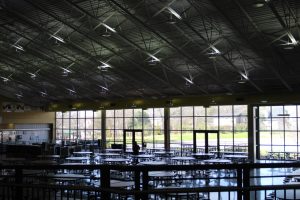
Clarke Central High School’s Miller Jordan, Jr. Food Court sits empty on Jan. 14. Due to the closure of Clarke County School District schools in order to contain COVID-19, volunteers from the Athens community are helping to distribute free meals to students in need from March 17-20. “CCSD is providing a tremendous service to its students during a time of great uncertainty,” Clarke Central High School 2016 alumnus Kevin Mobley, a food distribution volunteer, said. “I think the biggest takeaway from today is I want as many parents as possible to know about the program. Nearly every volunteer spot is filled up through the whole week.” Photo by Tessa Beckham
The Clarke County School District will provide free breakfast and lunch meals for students in need during the district-wide closure to limit the spread of COVID-19.
Due to Clarke County School District’s closure of schools until March 31 to contain COVID-19, the district will provide free breakfast and lunch meals for students beginning March 17.
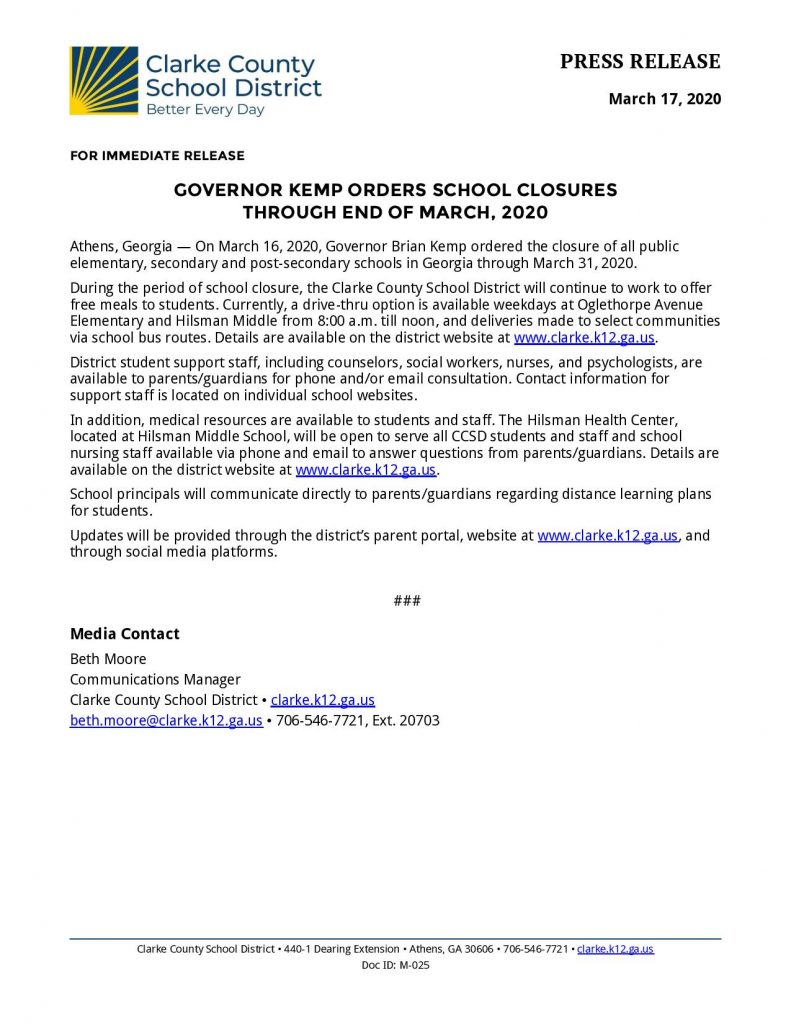
A March 17 press release details the closure of schools through the end of March because of an executive order from Georgia Governor Brian Kemp. During this closure, the Clarke County School District will continue to provide free meals to its students. “During the period of school closure, the Clarke County School District will continue to work to offer free meals to students,” CCSD Communications manager Beth Moore said in the press release. “Currently, a drive-thru option is available weekdays at Oglethorpe Avenue Elementary and Hilsman Middle from 8:00 a.m. till noon, and deliveries made to select communities via school bus routes.”
“We know food insecurity for students who rely on school meals is a major concern during school closures,” Georgia State School Superintendent Richard Woods said in a March 13 press release. “We are going to make sure there are options available for students as long as they’re needed, and state and district school nutrition staff are working round-the-clock to get this up and running for Georgia’s kids.”
The United States Department of Agriculture approved meal flexibility for students experiencing nutritional insecurities during the closure. For CCSD, this means a volunteer-based meal delivery via bus from Whitehead Road Elementary School, where meals are prepared, and drive-thru meal services at Hilsman Middle School and Oglethorpe Avenue Elementary School from 8 a.m. to noon each weekday.
“We’re operating the same system that we typically operate during the summer, our Seamless Summer (Option). Transportation is a known barrier for some of our families, so in order for them to get the nutrition they need during the summer, we take food out into the community on buses and so forth,” CCSD Director of School Nutrition Paula Farmer said. “We’ve got a collaborative approach going on. We’ve got social workers, psychologists, nurses and we have a team of experts here to help support families (all) to make sure we’re safe and make sure the families are safe as well.”
In addition, community members can sign up to help prepare, package and distribute meals to students.
“CCSD is providing a tremendous service to its students during a time of great uncertainty,” Clarke Central High School 2016 alumnus Kevin Mobley, a food distribution volunteer, said. “The smiles on students’ and parents’ faces when we told them what we had, as well as the sense of relief people felt, made it all worthwhile.”
“CCSD is providing a tremendous service to its students during a time of great uncertainty.”
— Kevin Mobley,
CCHS 2016 alumnus and food distribution volunteer
According to Mobley, the distribution team is taking certain health precautions to avoid spreading COVID-19 among these large groups at meal pickup sites.
“Volunteers split into groups of three or less per each bus route or volunteer station and also distance themselves on the buses. CCSD staff and volunteers are also in charge of distancing the lines if those do occur and advising students/parents on all CDC guidelines as it pertains to COVID-19,” Mobley said.
CCHS senior Cathy Bahena feels the meal distribution system will help to prioritize students while many are distanced from the daily nutritional support they rely on at school.
“A lot of people are getting infected by (COVID-19) and a lot of people are terrified about it. We need to let the community know that yes, something bad might be happening around us, but we’re still helping (out) as much as we can for our children,” Bahena said.

A graphic displays the Clarke County School District breakfast and lunch menus for the week of March 17-20. The district will provide two meals per student in need during the COVID-19-induced school closure through a drive-thru and bus delivery system. Information provided by the Clarke County School District, graphic by Audrey Enghauser
According to Farmer, certain logistical changes will be needed to ensure the efficiency of service in the coming weeks.
“We sent out 15 school buses loaded with food and we didn’t serve a lot of students,” Farmer said. “We’re planning to modify our hours beginning next week. We as a district did not feel comfortable changing hours this week since they’ve been published to the public. So next week, we will start later in the day thinking that will help, as well as extend our hours.”
Because the nutritional support plan relies on a large number of people, according to Farmer, any long term plan will ultimately depend on the larger implications of COVID-19.
“This method we have right now in place is not sustainable, especially being able to adhere to social distancing. We will hopefully be able to come up with a system where we could provide families with a whole week’s worth of meals at one time,” Farmer said. “We’re just continuing to assess daily, because things are changing daily.”
“We’re just continuing to assess daily, because things are changing daily.”
— Paula Farmer,
CCSD Director of School Nutrition

